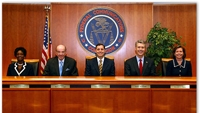FCC votes 5-0 to reclaim broadcast spectrum

The FCC voted unanimously last week to change its service rules for the TV band to make fixed and mobile services co-primary users along with UHF and VHF TV stations.
The action also proposed rules to allow for channel sharing so that more than one TV station can share a 6MHz channel and free up one or more channels for wireless broadband use. Such channel sharing is not allowed under current FCC rules. Channel sharers would each retain must-carry rights on cable and DBS.
The FCC also said it would adjust the power levels on VHF and look for other ways to boost its reception capabilities. That would pave the way for moving broadcasters from UHF allocations, which are better for DTV transmissions than VHF.
The commissioners also adopted changes to the rules to promote more testing of flexible spectrum use and dynamic-use technologies in the broadcast band. This might include more experimental testing for universities, research facilities and healthcare organizations.
The vote was further preparation for the day when broadcasters must decide to give up part of their spectrum in exchange for a portion of the money generated from the auction of that spectrum for broadband applications. The government is seeking to recover up to 120MHz of broadcast spectrum.
FCC Chairman Julius Genachowski said as of today broadcasters aren’t making full use of their spectrum. He said that that while some broadcasters had seized the opportunity to use their DTV spectrum for other uses like mobile DTV, others had not.
“We might think of the steady stream of broadcast TV transmissions as trains with a fixed number of box cars delivering digital content. But many of the box cars now are empty,” he said.
The professional video industry's #1 source for news, trends and product and tech information. Sign up below.
“The spectrum is too valuable and our spectrum needs too great for it to be used inefficiently in this manner, especially given that less than 10 percent of Americans receive broadcast television only through over-the-air spectrum signals,” the chairman added.
Democratic Commissioner Michael Copps agreed with Genachowski that broadcasters have been underutilizing their digital spectrum. “I am not interested in pushing broadcasters somewhere else or in discouraging their enhanced public interest stewardship of the airwaves,” he said. “But the public interest in multicasting remains all too often a concept and not a reality.”
Genachowski said the action to share channels, increase flexibility and adjust power was important groundwork for incentive auctions, which he called on Congress to pass — suggesting time is of the essence.
After the vote, the NAB issued a news release saying that the broadcast trade organization “will oppose government-mandated signal strength degradations or limitations, and new spectrum taxes that threaten the future of free and local broadcasting.”
